class: center, middle, inverse, title-slide # Week 05: Civil Wars ## Ending Civil Wars <html> <div style="float:left"> </div> <hr color='#EB811B' size=1px width=800px> </html> ### Danilo Freire ### 08 October 2019 --- <style> .remark-slide-number { position: inherit; } .remark-slide-number .progress-bar-container { position: absolute; bottom: 0; height: 6px; display: block; left: 0; right: 0; } .remark-slide-number .progress-bar { height: 100%; background-color: #EB811B; } .orange { color: #EB811B; } </style> # Last week we saw that... .font150[ * Civil war violence is not necessarily irrational * Violence prevents civilian defector and elicits information about enemies * Violence is unlikely in areas fully controled by the rebels/gov't forces * In contested areas, it's hard for groups to gather information about the enemies and defection is easy * Thus, _selective violence against civilians are more prevalent in areas over which the groups have dominant but incomplete control_ ] --- # Last week we saw that... .font150[ * Humphreys and Weinstein highlight another factor that explains violence against civilians in internal wars: _rebel group structure_ * Less cohesive groups tend to commit more violence: less control over rogue soldiers * They also find that material incentives also increase violence in civil wars * Note: no distinction between selective and indiscriminate violence here ] --- # Last week we saw that... .font130[ * Balcells focuses her attention on *conventional civil wars*, where insurgents and the government have similar resources * She affirms that Kalyvas and H&W focused too much on *irregular wars*, or guerrillas * While guerrillas fight for territorial control, in conventional civil wars rebel groups control well-delineated areas * Violence occurs due to rivalry and revenge: - Rivalry: When parties have parity, small victories can be decisive, so groups are more likely to fight - Revenge: Higher levels of violence by an armed group at `\(t_1\)` leads to retaliation by the rival group in `\(t_2\)` ] --- # Last week we saw that... .font150[ * Wartime rape has its own logic * Ethnic rivalries, greed, and gender norms are conventional explanations * Rape is a socialisation tool: increases rebel group cohesion and boosts rebels' self-esteem * Cohen finds that rape is associated with state collapse and rebel group characteristics ] --- class: inverse, center, middle # How do civil wars end? <html><div style='float:left'></div><hr color='#EB811B' size=1px width=720px></html> --- # Why do some civil wars last so long? .font150[ * Civil wars vary greatly in duration—some end within months; others last for decades * Military victory does happen in civil war, but it is rare ] -- .font150[ * **Question**: why do you think that's the case?] -- .font150[ * Wars last longer when parties perceive the war as less costly relative to peace * And when combatants are overly optimistic about winning the war ] --- # Why do some civil wars last so long? .font150[ * Some parties cannot accept a division of the issues at stake * Government or rebels are unable to trust the commitments * More combatants increase coordination costs] --- # Fearon (2002) .center[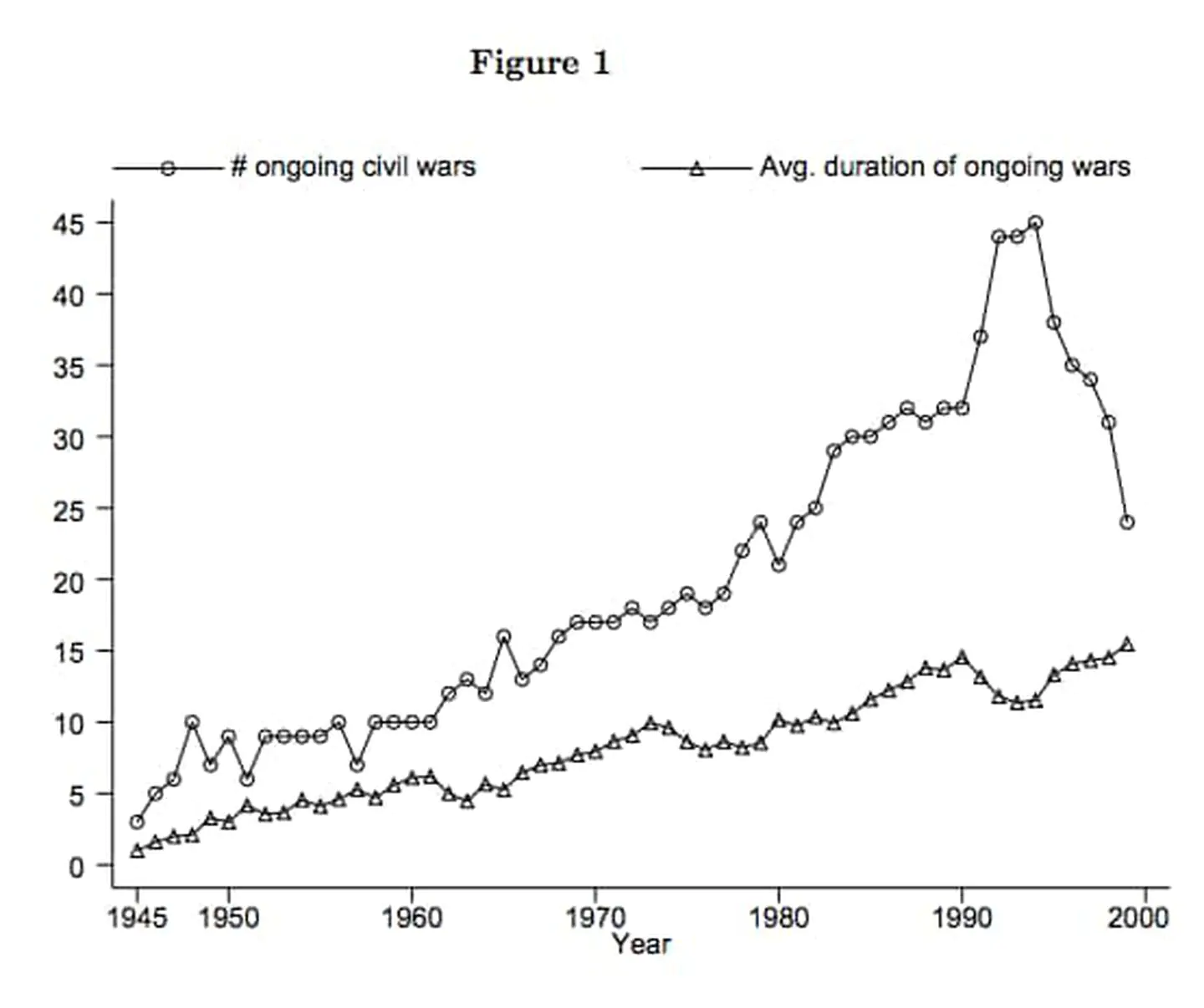] --- # Washington Post, 2013 .center[] --- # Washington Post, 2013 .center[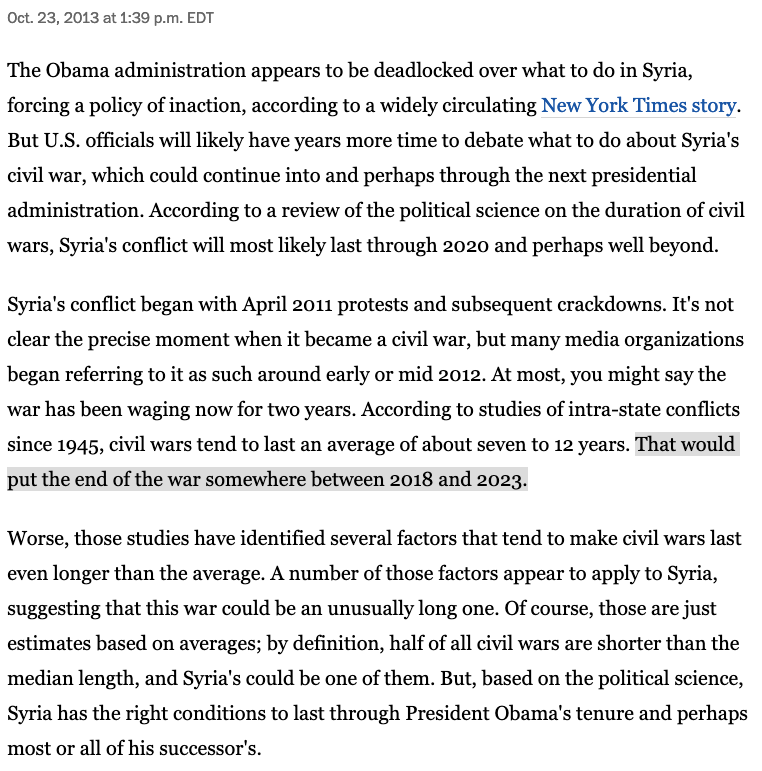] --- # Walter (1997) .center[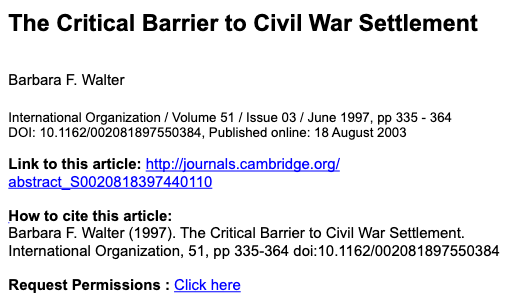] --- # Negotiated settlements are rare .font130[ * While most international wars end in agreements, negotiations are unfrequent in civil wars * "Most internal wars ended with the extermination, expulsion, or capitulation of the losing side" * Groups almost always choose to fight instead of pursuing an agreements * Puzzle: if civil wars are costly for both parties, why do conflicts often last so long? ] -- .font130[ * Negotiations fail because civil war opponents are asked to do what they consider unthinkable: *lay down their weapons and integrate into the national army* ] --- # Why don't negotiations work? .font150[ * Many rebel groups/governments _do_ try to reach agreements during civil wars * But peace talks often fail * Problem: lack of neutral police force and government enforcement ] --- # Cooperation under anarchy .font150[ * Countries can use international organisations, military alliances, or trade agreements as incentives * Domestic factions don't have the same options * Settlements make parties vulnerable and compliance is risky * No credible democratic institutions ] --- # Third-party guarantees .font150[ * A mediator can increase the costs of punishment for non-compliers * Three conditions: - Guarantor must have an interest in peace: colonial ties, economic interests, etc - Must be willing to use force if needed - Must be able to signal resolve: promises have to be credible ] --- # Five hypotheses .font140[ * H1: Credible guarantees on the terms of the settlement are almost impossible to arrange by the combatants themselves - Need for a third party * H2: Successful settlements should be more likely as the expected costs of winning a war increases - Losers have an incentive to start peace talks * H3: Adversaries are more likely to settle when stakes are easier to divide - Financial arragements, political participation ] --- # Five hypotheses .font150[ * H4: The greater the skill of the mediation, the greater the likelihood of a peace deal - Credible commitments * H5: Ethnic/cultural conflicts are harder to solve - Groups cannot find common ground * **Question**: how is H5 different from H3? ] --- # Results .center[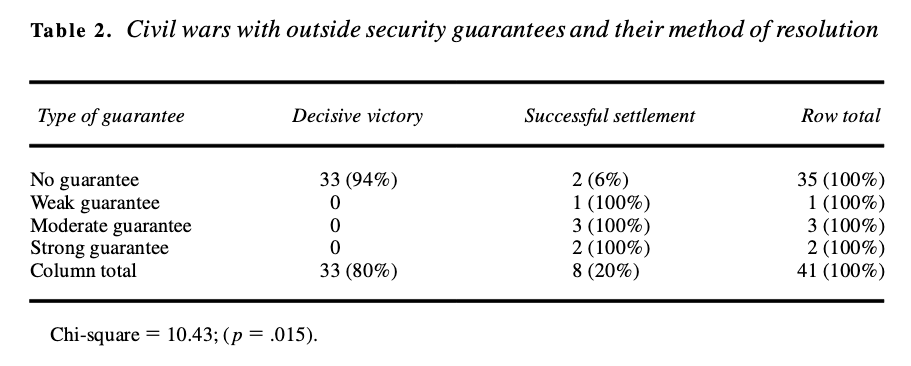] --- # Results .center[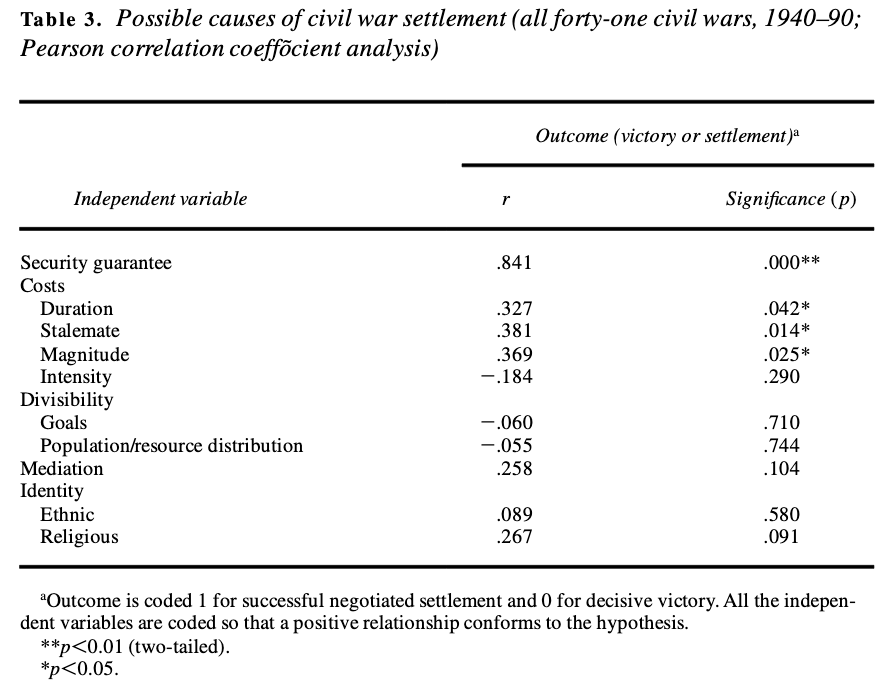] --- # Discussion .font150[ * Strong relationship between security guarantees and settlement * Longer, larger civil wars are more likely to be mediated * Military stalemates increase the chance of successful negotiations * Issue divisibility and ethnic motivations are unrelated with the outcomes (decisive victory or negotiated settlements) ] --- # Conclusion .font150[ * The findings offer support for the credible-commitment theory of conflict resolution * A third party is necessary because groups are unable to compromise * The findings hold even for ethnic civil wars * Implications: - Peacekeeping operations should be willing to use force - Mediators might even be biased, as long as they show resolve - Guarantors should stay during the whole process ] --- # Conclusion .font150[ * Remember: Walter stresses that security guarantees are a necessary, *but not sufficient*, condition for peace * **Question**: Does her theory sound somewhat familiar to you? ] --- # Leviathan .center[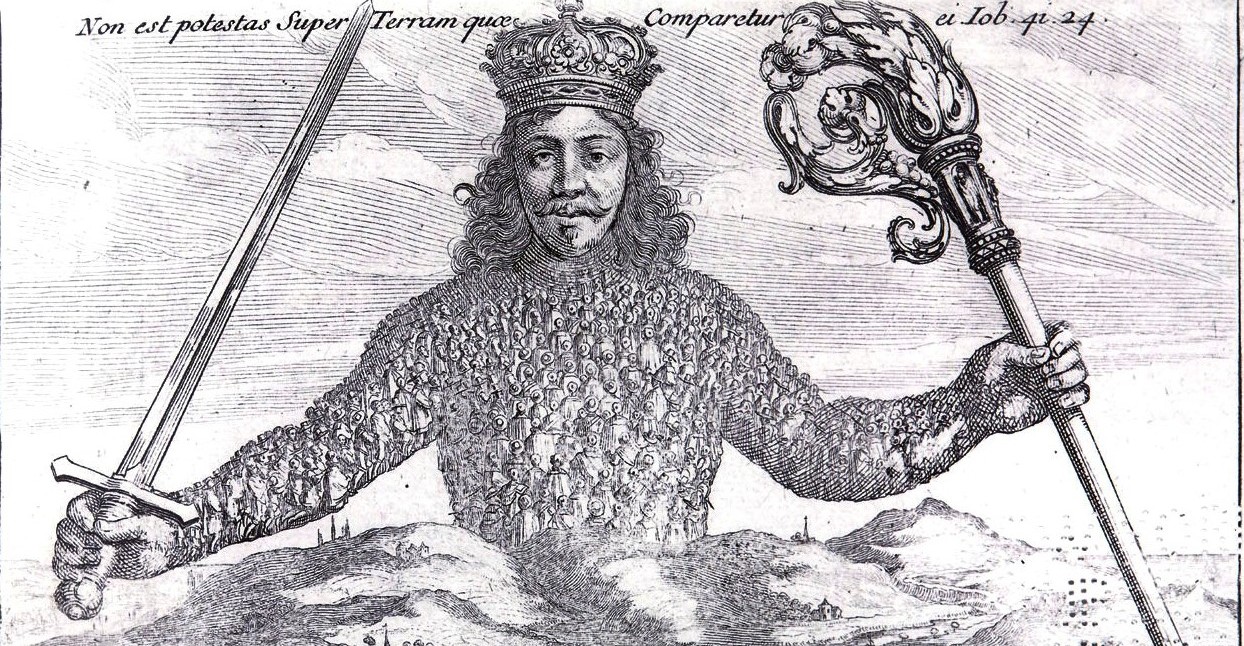] --- class: inverse, center, middle # Questions? <html><div style='float:left'></div><hr color='#EB811B' size=1px width=720px></html> --- # Fortna (2004) .center[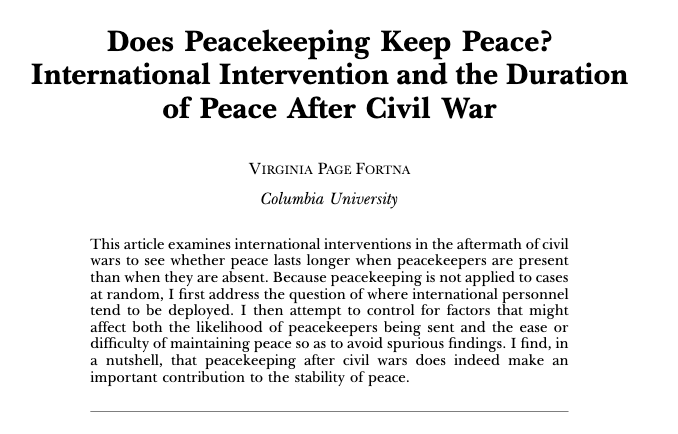] --- # Do peacekeeping operations work? .font150[ * Walter mentions the importance of security guarantors * Peacekeeping operations provide third-party law and police enforcement * In a sense, Fortna puts Walter's theory to test (at least partially) ] --- # Do peacekeeping operations work? .font150[ * Opponents of peacekeeping point out many failed operations: - Sierra Leone, Darfur, etc * Fortna accuses them of two biases: - Pessimism bias - Selection bias * **Question**: what does selection bias mean in this case? ] --- # Do peacekeeping operations work? .font150[ * Peacekeeping decisions *are not random* - Forces are deployed only to the very worst conflicts - E.g.: conflicts with more than two parties or when victory is unlikely * To have an accurate assessment of the effect of peacekeeping operations, we should compare similar cases only ] --- # Where do peacekeepers go? .center[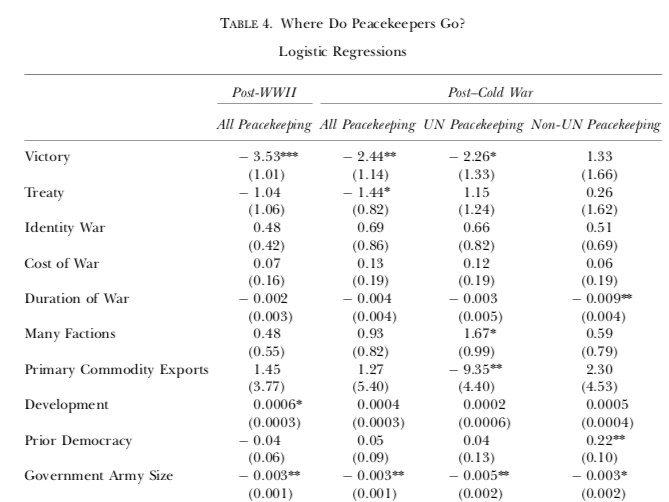] --- # What is the effect of peacekeeping? .center[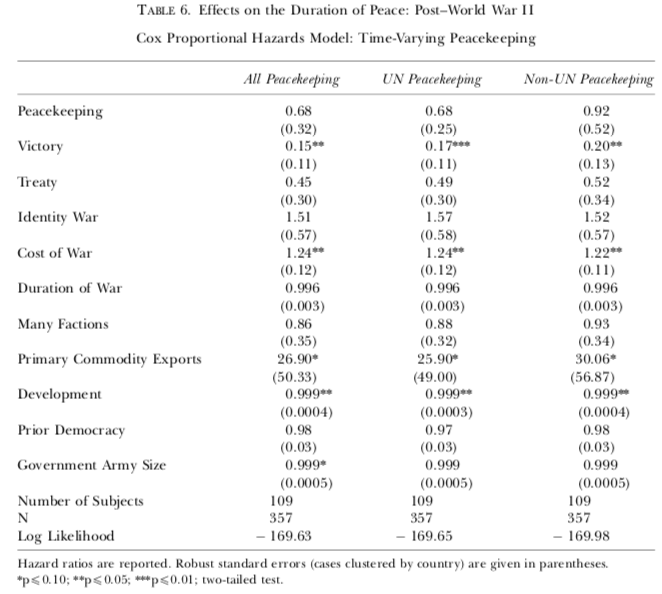] --- # What is the effect of peacekeeping? .center[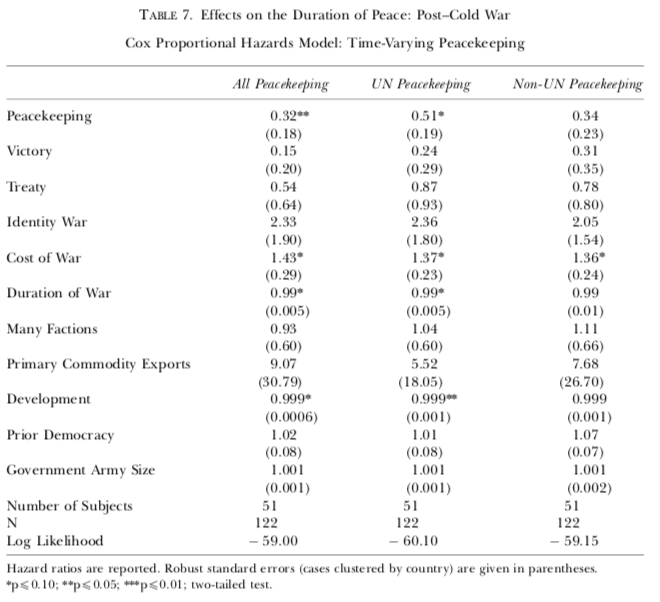] --- # Types of peacekeeping missions .center[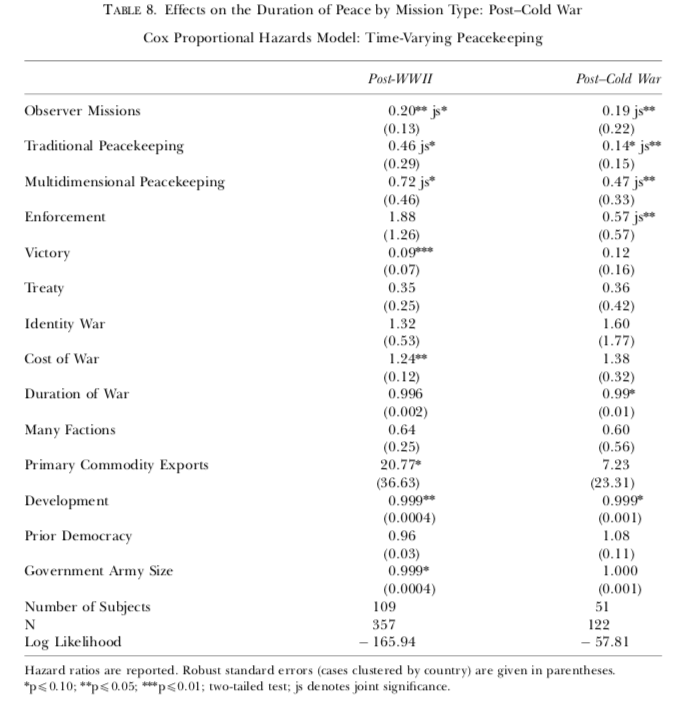] --- # Discussion .font150[ * While peacekeeping has little effect on the whole Post-WWII period... * ... it has a negative effect on civil war duration after 1991 * Evidence that peacekeeping operations are getting more effective * All types of peacekeeping operations seem to reduce civil war duration ] -- .font150[ * *Yes, peacekeeping does keep peace* ] --- class: inverse, center, middle # Questions? <html><div style='float:left'></div><hr color='#EB811B' size=1px width=720px></html> --- # Howard and Stark (2018) .center[] --- # Howard and Stark (2018) .font150[ * While in the 1990s civil wars were more likely to end in negotiated agreements... * The trend seems to have reversed * Post-9/11: stabilisation over democratisation and non-negotiation with terrorist groups * Neorealist explanation: the nature of the international system explains civil war duration ] --- # Unipolarity .font150[ * During the Cold War, the US tried to win decise victories - Interventions were credible * In the post-Cold War years, the US doesn't not need to intervene so strongly - No other superpower to compete for influence * Colour Revolutions, Arab Spring have also shown that democratisation is not always feasible * Solution: stabilisation instead of regime change ] --- # Three periods .center[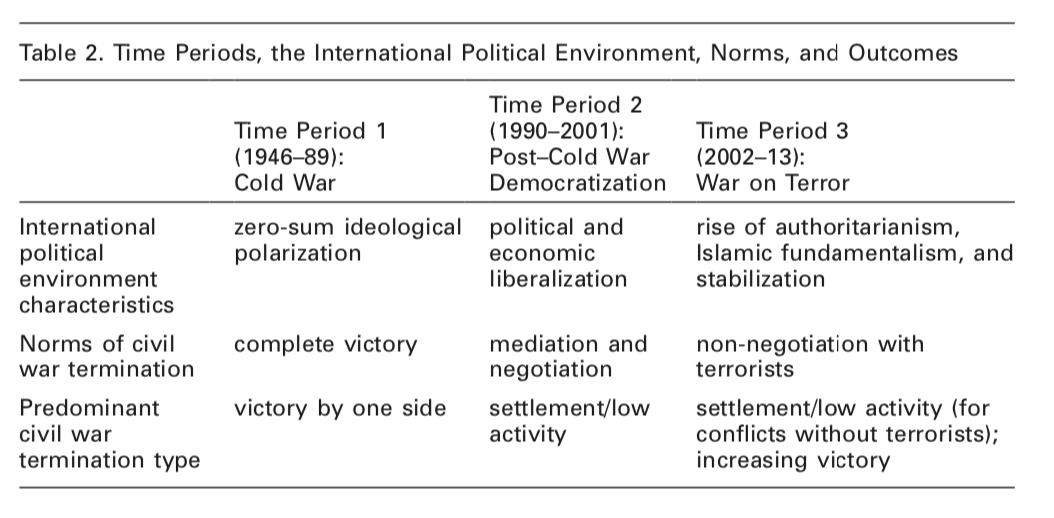] --- # Three periods .center[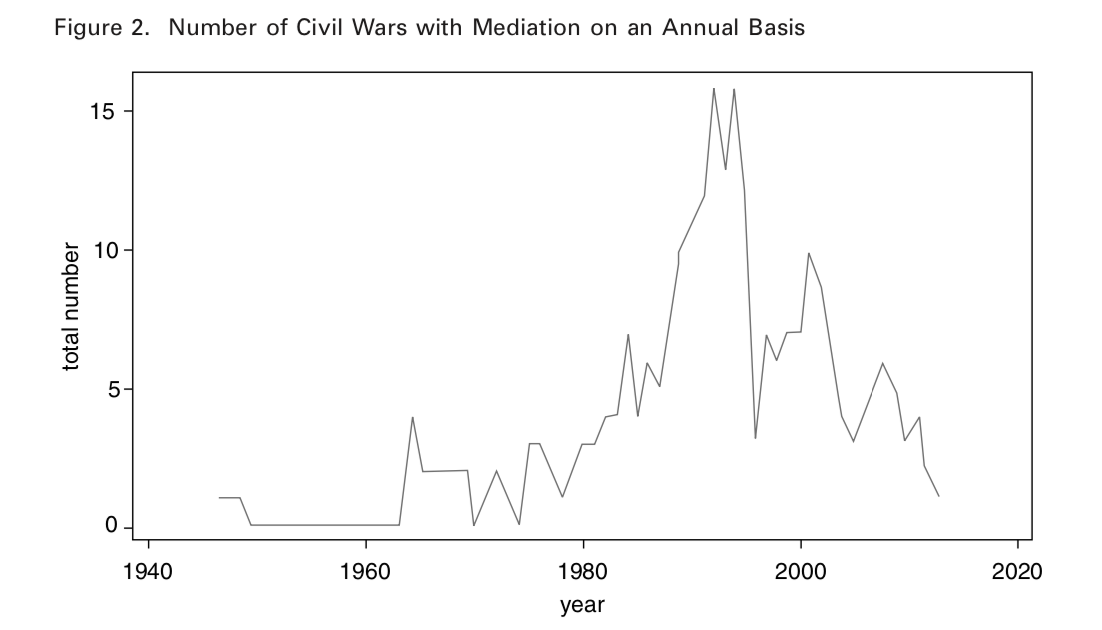] --- # Text analysis .center[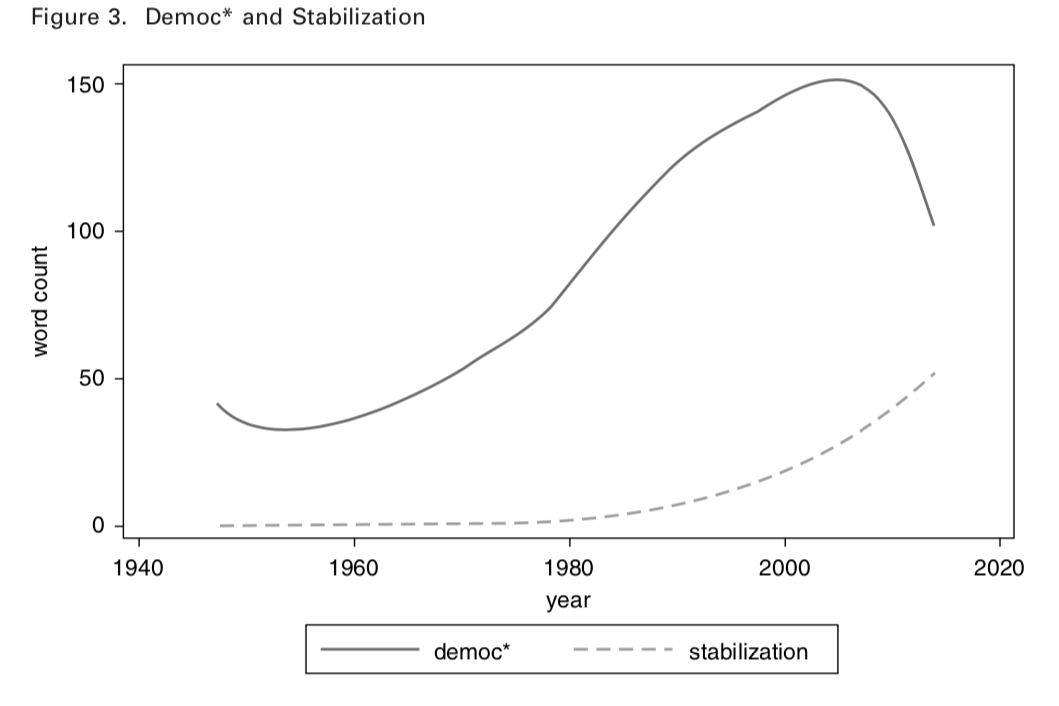] --- # New norms .font150[ * Since 9/11 the US and other powers applied new norms of anti-terrorism in civil wars where Islamists were involved - Afghanistan, Central African Republic, Iraq, Syria, etc * No negotiations with terrorist groups * Result: civil wars are less likely to end ] --- # Questions .font150[ * Will these norms change with the rise of China? What would be the impact of a new bipolar world on civil war duration? * Why is there no push for democratisation from European countries? * Should the US promote democracy abroad? ] --- class: inverse, center, middle # Questions? <html><div style='float:left'></div><hr color='#EB811B' size=1px width=720px></html> --- # Findley & Young (2015) .center[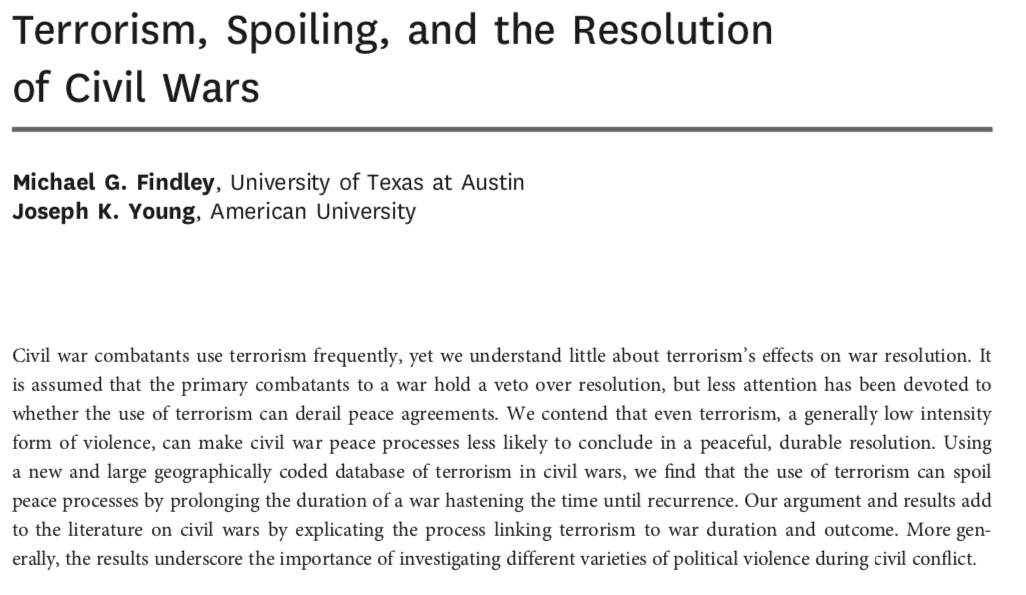] --- # Findley & Young (2015) .font150[ * How does terrorism affect civil war termination? * Extend civil war research beyond rebels versus governments * *Spoilers*: individuals or small groups that derail a peace process * *De facto* "veto players" in negotiations ] --- # Terrorism in civil conflicts .font150[ * Groups can use terrorism in three different ways during the peace process: - Before, during, and after the peace process * **Question**: why would they do so?] -- .font150[ * Early in the process, to be included in the negotiations * During the process, to increase their bargaining power * After the process, to alter or derail the original agreement ] --- # Hypotheses .font150[ * H1. As terrorism occurs more frequently, the duration until a war ends should increase * H2. As terrorism occurs more frequently, the duration of postwar peace should decrease. * Mechanisms: erodes trust among parties and create incentives for individuals to fight * They proxy spoiling by a measure of terrorist attacks directly connected to civil wars ] --- # Results .center[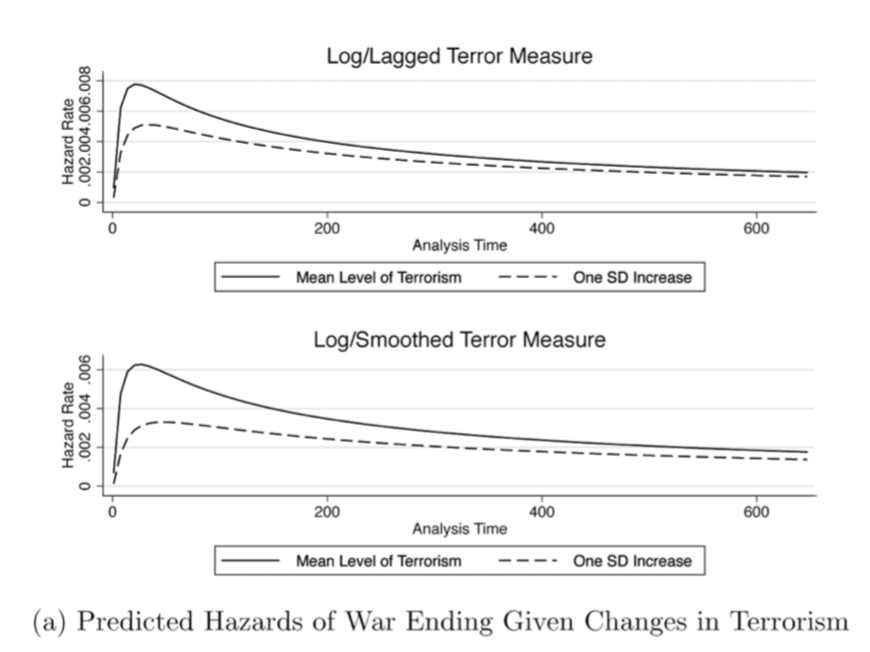] .font150[ More terrorism decreases the chance of civil war termination ] --- # Results .center[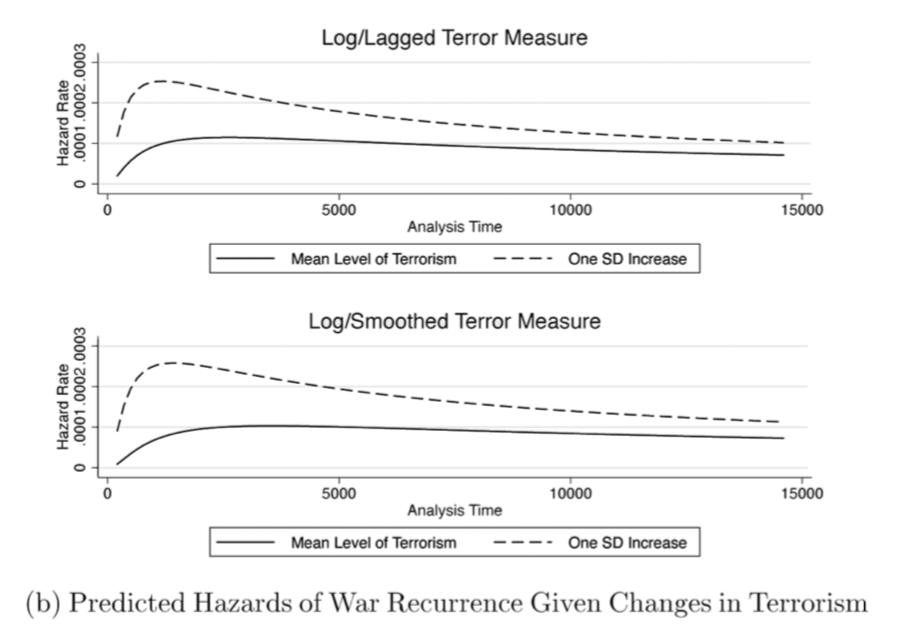] .font150[ * More terrorism increase the likelihood of civil war recurrence ] --- # Discussion .font150[ * The results confirm both hypotheses: - Terrorism increases the duration of civil wars - And it also increases the chance a new conflict will erupot * **Question**: Kalyvas states that indiscriminate violence is counter-productive. Under what conditions his statement is true? And when is it false? ] --- class: inverse, center, middle # Questions? <html><div style='float:left'></div><hr color='#EB811B' size=1px width=720px></html> --- --- # Toft (2010) .center[] --- # Two views on civil war termination .font150[ * First, negotiated agreements are always the best option - The sooner the conflict ends, the better * "Give war a chance" - Decisive victories lead to more stable states * What are the pros and cons of each approach?] -- .font150[ * (Yes, "giving war a chance" is a serious argument!) ] --- # Some background information .font150[ * Civil wars than ended in victory are twice as likely to remain settled when compared to cease-fires or negotiated agreements * Wars ended through negotiated settlement were twice as likely to reignite as those ending in victory * Rebel victories were more stable than government victories ] -- .font150[ * *Should we then hope for a rebel victory?* ] --- # Results .center[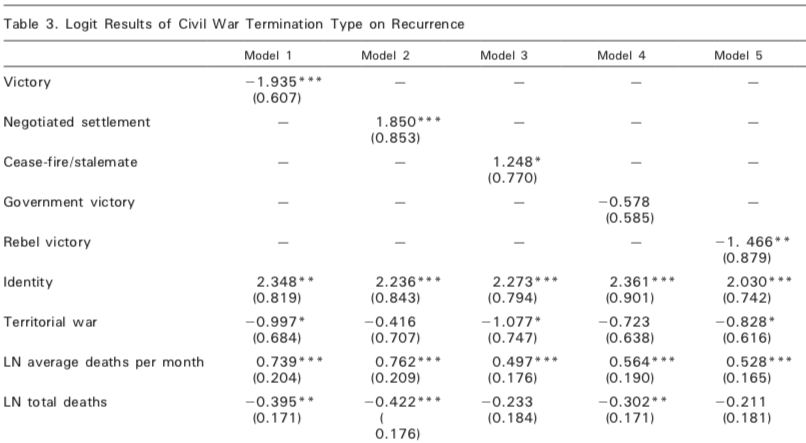] --- # Results .center[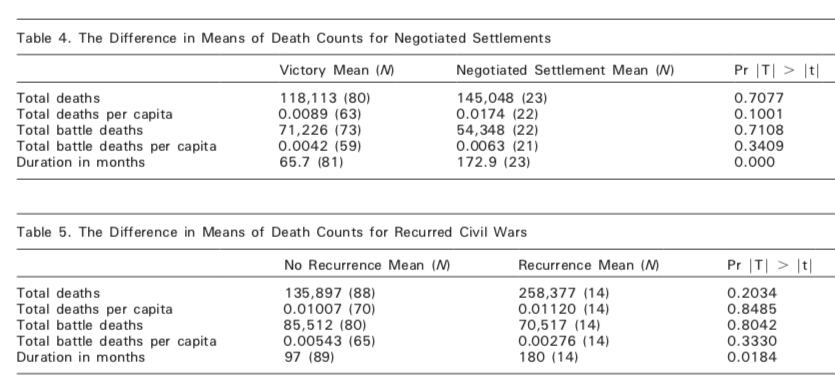] --- # Discussion .font150[ * Victories decrease the duration of civil wars (model 1) * Negotiated settlements, in contrast, increase them (model 2) * Government victory *does not* seem to decrease civil war duration * The effect comes from rebel victories * No difference between wars than ended in victories or settlements in any measure except duration ] --- # Post-civil war politics .font150[ * What is the effect of victories on post-civil war democratisation? * Polity IV: -10 (most authoritarian) to +10 (most democratic) ] --- # Results .center[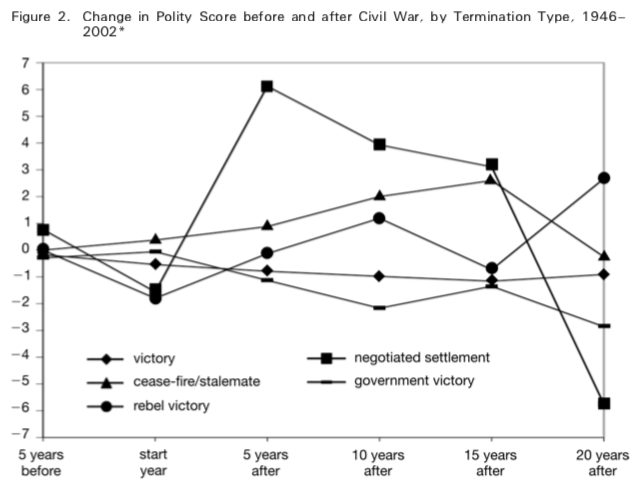] --- # Discussion .font150[ * Negotiated settlements are associated with greater levels of authoritarianism as the postwar period is extended * Incumbent governments seem to sink precipitously into authoritarianism * Cease-fires/stalemates do not appear to have an impact on democratisation * *Levels of autocracy decreased after rebel victories*] --- # Post-civil war prosperity .center[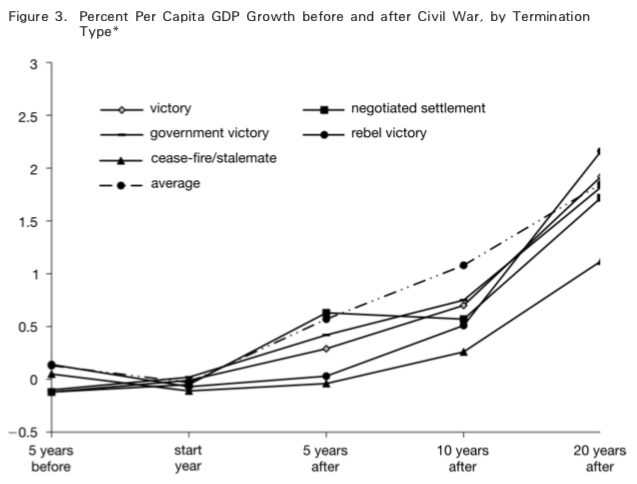] --- # Discussion .font150[ * Economic growth or decline is unrelated to the type of civil war settlement * Rebel victory does not seem to negatively impact economic growth ] --- # Mechanisms .font150[ * **Question**: why do insurgents promote better governance when they win the war? Do they? ] -- .font150[ * Rebels have to address popular grievances * They do not have international recognition * Face little opposition to implement reforms ] --- # Case study 1: Uganda .center[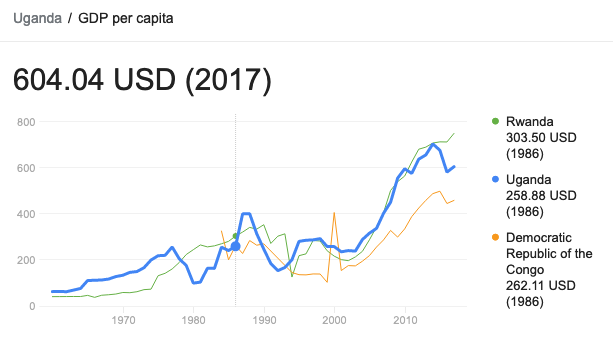] --- # Case study 1: Uganda .center[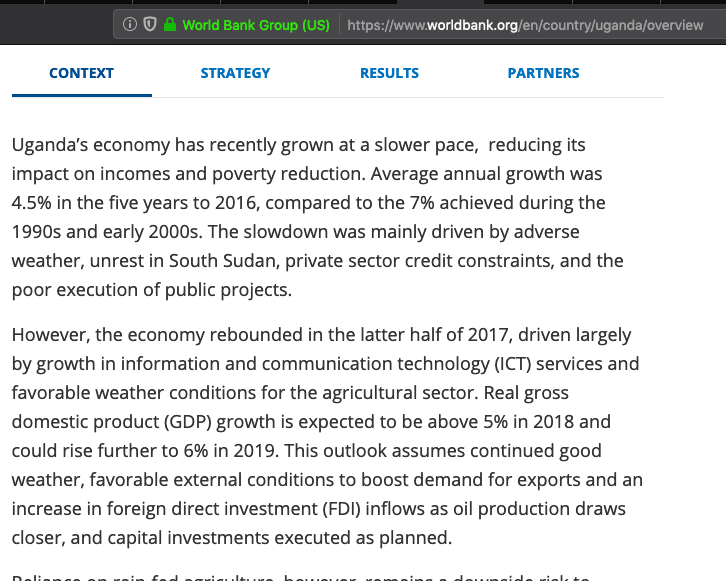] --- # Case study 1: Uganda .center[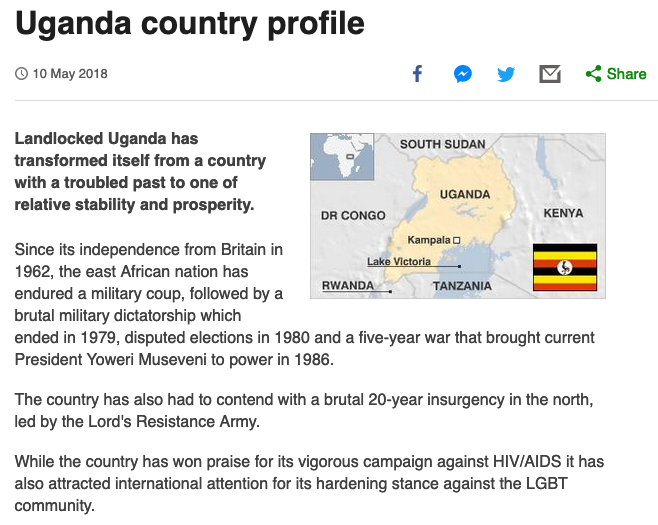] --- # Case study 2: Somaliland .center[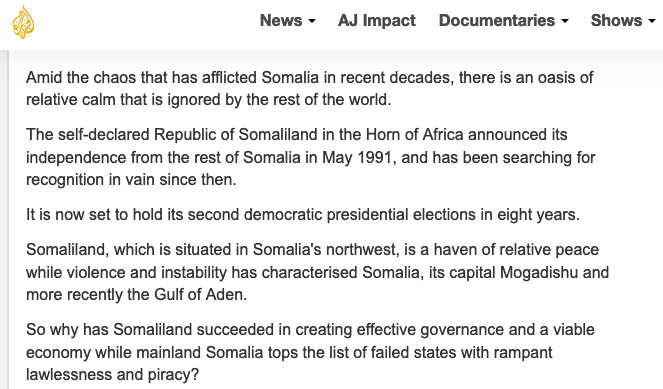] --- # Case study 2: Somaliland .center[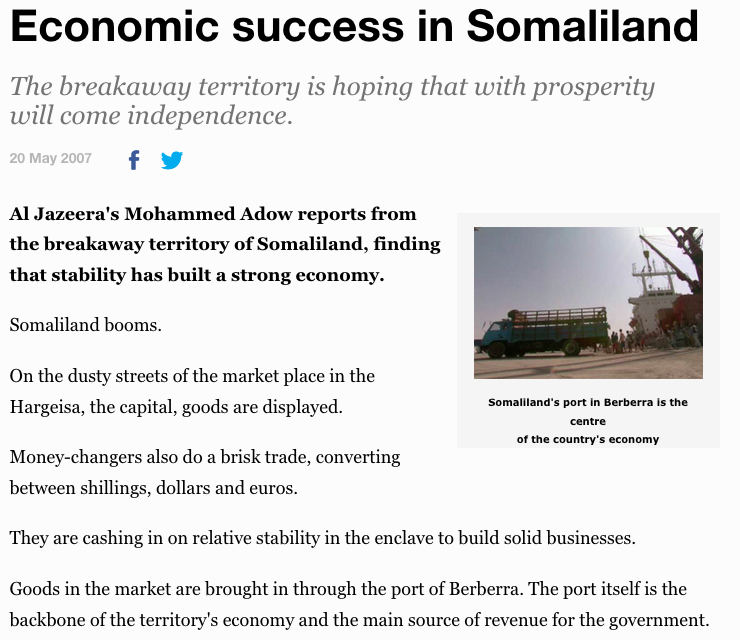] --- # Case study 2: Somaliland .center[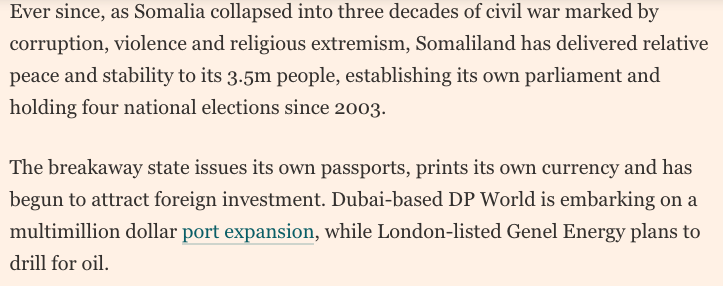] --- class: inverse, center, middle # See you next week! <html><div style='float:left'></div><hr color='#EB811B' size=1px width=720px></html>